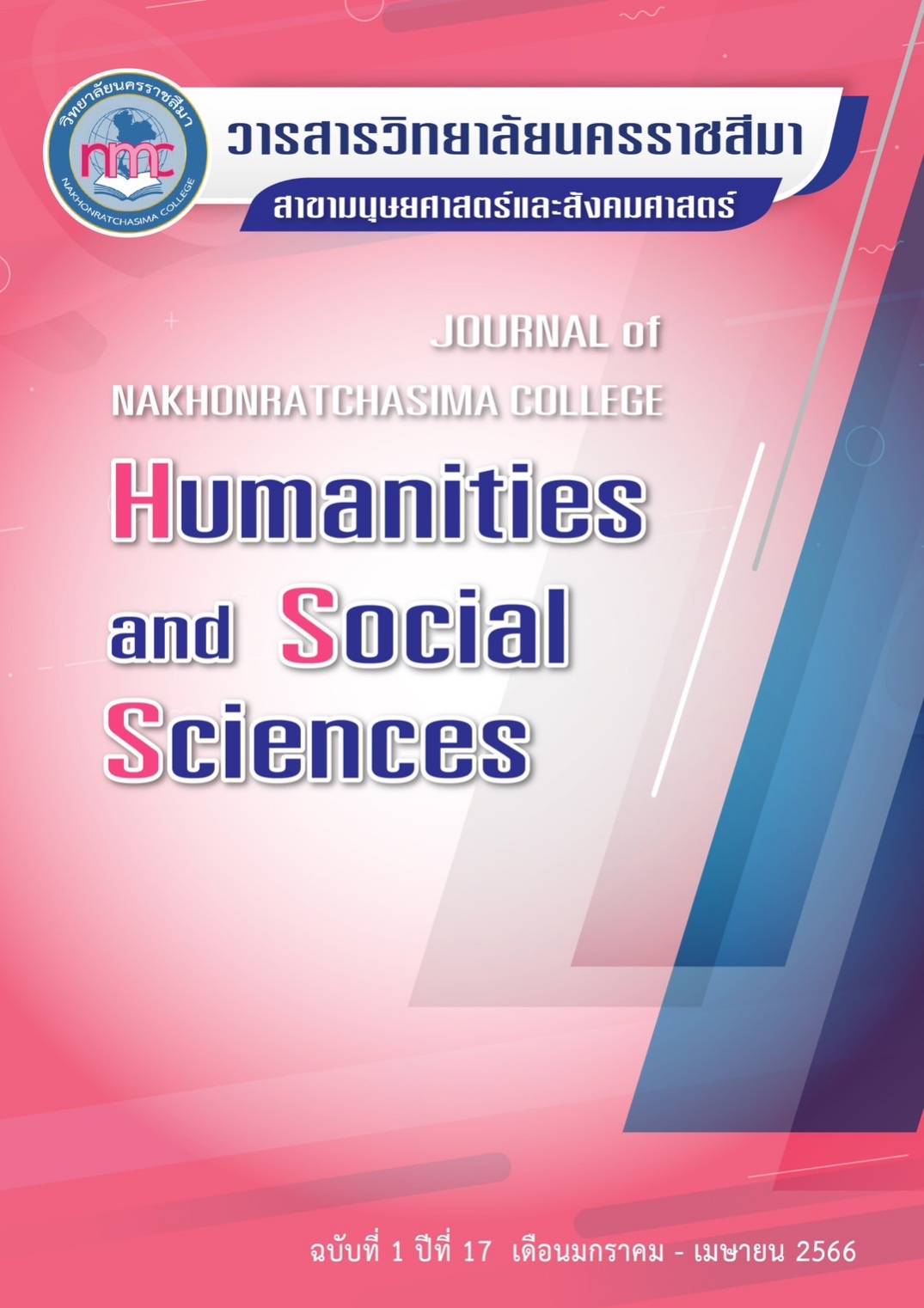ปัจจัยเชิงกระตุ้นที่ส่งผลต่อการตัดสินใจเลือกทำงานในธุรกิจโรงแรมของกลุ่ม Generation Z ในเขตกรุงเทพมหานคร
Motivating Factors Affecting Job Selection in the Hotel Business of Generation Z in Bangkok
คำสำคัญ:
ปัจจัยเชิงกระตุ้น, การตัดสินใจเลือกทำงาน, ธุรกิจโรงแรม, Generation Zบทคัดย่อ
การวิจัยในครั้งนี้ มีวัตถุประสงค์ 1) เพื่อศึกษาระดับของปัจจัยภายในและปัจจัยภายนอกที่ส่งผลต่อการตัดสินใจ 2) เพื่อศึกษาองค์ประกอบของปัจจัยที่ส่งผลต่อการตัดสินใจ และท้ายที่สุด 3) เพื่อวิเคราะห์ถึงความต้องการในการเลือกทำงานในธุรกิจโรงแรมของกลุ่ม Generation Z ในเขตกรุงเทพมหานคร
ผลการวิจัยพบว่า จากการสกัดปัจจัยที่มีผลต่อการตัดสินใจเลือกทำงานในธุรกิจโรงแรม ด้วยวิธีการวิเคราะห์องค์ประกอบ (Factor Analysis) สามารถจำแนกได้ 6 ปัจจัย คือ ความภาคภูมิใจในงาน ลักษณะของงาน และทัศนคติในงาน ซึ่งถือเป็นปัจจัยภายใน สำหรับปัจจัยภายนอกได้แก่ บรรยากาศในการทำงาน ความมั่นคงในอาชีพ ตลอดจนค่าตอบแทนและสวัสดิการ ซึ่งทั้ง 6 ปัจจัยถือเป็นปัจจัยเชิงกระตุ้นที่สำคัญ จากนั้นได้ทำการศึกษาความต้องการในการเลือกทำงาน โดยวิธีการวิเคราะห์การถดถอยแบบโลจิสติกส์ (Logistic Regression Analysis) ผลการศึกษาพบว่า จากการวิเคราะห์ดังกล่าวสามารถพยากรณ์ความต้องการในการเข้าทำงานในธุรกิจโรงแรมของกลุ่ม Generation Z ได้มากถึงร้อยละ 89 โดยทัศนคติในการทำงานเป็นสิ่งสำคัญที่ทำให้กลุ่ม Generation Z ในเขตกรุงเทพมหานครตัดสินใจทำงานในธุรกิจโรงแรม
เอกสารอ้างอิง
Banpato, P. (2019). Factors Affecting Decision-Making on Working in the Service Industry of Bachelor’s Degree Student Majoring in Hotel Management Studying in Bangkok and Suburban Areas. Thesis of Hospitality and Tourism Management. Bangkok University, Bangkok.
Bencsik, A., & Machova, R. (2016). Knowledge Sharing Problems from the Viewpoint of Intergeneration Management. In ICMLG2016 - 4th International Conference on Management, Leadership and Governance: ICMLG2016 (p. 42). Academic Conferences and publishing limited.
Bielen, M., & Kubicze, J., (2020). Response of the labor market to the needs and expectations of Generation Z. e-mentor, 4(86), 87–94.
Changplee, N. (2021). The Motivation for The Performance of Central Personnel at The Court of Justice. Ramkhamhaeng University Journal. Bangkok. 1-15
Chompukum, P. & Chakrapeesirisuk, N. (2020). Factors Affecting Job Satisfaction and Motivation: A Case Comparison of Generation Y and Generation Z in Bangkok. Chulalongkorn Business Review. Volume 42(3) Issue 165 (July-September 2020) pp.1-18
Frankel, J.R. (1977). How to teach about values: An analytic approach. New Jersey: Prentice Hall.
Fombrun, C. J. (1996). Reputation: Realizing value from the corporate image. Boston, MA: Harvard Business School Press.
Gattiker, U. E., & Larwood, L. (1986). Subjective Career Success: A Study of Managers and Support Personnel. Journal of Business and Psychology, 1(2), 78-94.
Hasaranga, D. J. (2021). Employee development and retention of Generation-Z employees in the post-COVID-19 workplace: a conceptual framework. Benchmarking: An International Journal. Vol. 28 No. 7, 2021 pp. 2343-2364.
Herzberg, F. (1966). Work and the Nature of Man. World Publishing, New York
Husainah, N. & Hafnidar, S. and Limakrisna, N. (2022). Determinants of Self-Efficacy to Generation Z Job Satisfaction. Journal of Positive School Psychology. 2022, Vol. 6, No. 5, 850 – 860
Litwin, G. H., & Stringer, A. (1968). Motivation and organization climate. Boston: Harvard University.
Manakasem, C. (2021) Decision Making to Work with The State Audit Office of The Kingdom of Thailand of The Central Personnel. Ramkhamhaeng University Journal. Bangkok. 1-15
Mohamad, Z. B. M. (2020). Vocational College Teachers in Malaysia: Confirmatory Factor Analysis for Job Attitude. PalArch’s Journal of Archaeology of Egypt/Egyptology. 17(9), 5091-5098
Munn, N.L. (1971). The evolution of the human mind. Boston: Houghton Mifflin Harcourt (HMH)
Ngamphattarwith, R. (2016). Factors Affecting Graduate Student Choice of Assistant Auditor Jobs at Big Four Accounting Firms in Thailand. Thesis of Master of Business Administration. Thammasat University, Bangkok.
Nunnally, J. C. (1967). Psychometric Theory. New York: McGraw-Hill
Patanakidcharoenchai, A. (2011). Employees' decision to choose foreign migrant workers in Changwat Rayong. Thesis of Social Work Program. Thammasat University, Bangkok.
Pongwichai, S. (2009). The statistical analysis. Bangkok: Chulalongkorn University
Royal Thai Government. (2020). Covid Situation in Thailand. [online]. Retrieved from https://www.thaigov.go.th/search?keyword=Covid. (2022, 1 October)
Sanguansak, J. (2022). A study of organizational structure, working atmosphere and colleagues affect the quality of life for personnel in the bureaucratic unit in Bangkok Metropolitan Area. Thesis of Business Administration. Bangkok University, Bangkok.
Srisa-ard, B. (2011). Principle of Statistic. Reprint 9. Suweerivasarn Press, Bangkok.
Sungthong, V. (2017). A Motivation for Work Performance of the Workers at Wako Sangyo (Thailand) Co. Ltd., Chonburi Province. Thesis of Liberal Arts. Krirk University, Bangkok.
Thakoet, A. (2020). Influential Factors of Organization Selection Among Members of Generation Y Through A Recruitment Agency in Asoke in The Bangkok Metropolitan Area. Faculty of Business Administration for Society, Srinakharinwirot University, Bangkok
Vanichbuncha, K. (2007). Principle of Statistic. Chulalongkorn University Press, Bangkok
Zeena F.D. & Suresh P. (2018). Employee Attitude towards Organizational Commitment: A Literature Survey. Journal of Business and Management, Volume 20, Issue 1. Ver. VIII (January. 2018): 21-27.
ดาวน์โหลด
เผยแพร่แล้ว
รูปแบบการอ้างอิง
ฉบับ
ประเภทบทความ
สัญญาอนุญาต
จรรยาบรรณผู้เขียนบทความ
ผู้เขียนบทความต้องรับรองว่าบทความนี้ไม่เคยตีพิมพ์ในวารสารใดหรือสิ่งพิมพ์อื่นๆ มาก่อน ต้องไม่คัดลอกผลงานผู้อื่นมาปรับแต่งเป็นบทความของตน และไม่ได้อยู่ระหว่างการเสนอเพื่อพิจารณาตีพิมพ์ อีกทั้งยอมรับหลักเกณฑ์การพิจารณาและการตรวจแก้ไขบทความต้นฉบับโดยกองบรรณาธิการวารสารวิทยาลัยนครราชสีมา สาขามนุษยศาสตร์และสังคมศาสตร์
บทความทุกเรื่องได้รับการตรวจพิจารณาทางวิชาการโดยผู้ทรงคุณวุฒิที่มีประสบการณ์และมีความเชี่ยวชาญตรงตามสาขาของบทความ ซึ่งผู้เขียนต้องแก้ไขตามคำแนะนำของผู้ทรงคุณวุฒิภายในระยะเวลาที่กำหนด หากไม่เป็นไปตามกำหนดกองบรรณาธิการขอสงวนสิทธิ์และยกเลิกการตีพิมพ์โดยจะแจ้งให้ทราบต่อไป
ข้อความที่ปรากฏในบทความของวารสารนี้เป็นความคิดเห็นของผู้เขียนซึ่งไม่เกี่ยวข้องกับวิทยาลัยนครราชสีมาแต่อย่างใด และกองบรรณาธิการขอสงวนสิทธิ์ในการพิจารณาและตรวจประเมินบทความเพื่อตีพิมพ์ในวารสารของวิทยาลัยนครราชสีมา สาขามนุษยศาสตร์และสังคมศาสตร์



